Highest Paid Doctors in Canada | Doctor Salary

Do you know how much doctors really make? The average doctor’s salary often remains an elusive secret. Let’s pull back the curtain. And explore the truth behind those elusive numbers.
The honest answer is that no one knows for sure. It’s mostly ballpark figures and educated guesses. But why does this matter? And what shapes these numbers behind the curtain?
In this post, I will introduce the medical specialties with the highest salaries. Explain those multiple factors that influence doctor salary in Canada. Discuss the key to earning a high salary as a physician in Canada. Also, explore the best resource for the MCCQE Part 1 exam preparation.
Doctor Salary in Canada

Have you ever paused to truly consider what it means to be a doctor in Canada? It’s not merely about the long hours. The weighty responsibilities resting on their shoulders.
There is, of course, the substantial paycheck that accompanies this vocation. Yet, beyond the paycheck itself lies a deeper story. One that speaks to dedication, sacrifice and complexity.
Many ask; how much do doctors really make here? This question resonates widely. The image of physicians as high earners is prevalent in popular consciousness. But when we look closer.
We find a reality nuanced with challenges and varied experiences. In exploring these layers. We uncover a portrait of medicine in Canada that is as intricate as it is revealing.
I remember chatting with a colleague over coffee in Toronto. She’d just finished her residency. And was weighing her options. “Is it really worth it?” she asked. “The years of study, the stress. Will the salary match the effort?”
That question sticks with me because it’s more than numbers. It’s about the value of a life dedicated to healing others.
Here’s the truth. Doctor incomes vary widely and the path to those salaries. Involves a mix of hard work, long training and sometimes tough choices about where to work.
You may have searched online for doctor salaries and landed on some websites like Indeed or Payscale. These websites show you high numbers on charts. But those numbers don’t tell the full story.
There are many hidden factors that affect how much a doctor actually earns each year. These factors can include things like the cost of running a practice and the time doctors spend on non-patient work.
More importantly, payment Models. Is it a paid fee-for-service or blended payment? All of these change a doctor’s annual salary, sometimes by a lot.
The best part about practicing in Canada is that the healthcare system is designed to take care of those factors. So doctors can focus on patients without worrying as much about complicated billing or unpredictable pay.
As Winston Churchill once said,
To each, there comes in their lifetime a special moment. When they are figuratively tapped on the shoulder and offered the chance to do a very special thing.
For many doctors in Canada, that moment also comes with financial realities that shape their career choices.
What Is the Average Salary of Doctor in Canada?
In the midst of rigorous study and demanding hours. It’s only human to wonder about life beyond the textbooks.
The reality is stark. Medicine demands so much from you. Yet, understanding the average salary of doctors across Canada offers clarity. An anchor for many navigating this challenging but noble path.
But how much is the average salary of a doctor in Canada? The answer isn’t simple. On average, family doctors in Canada. Earn between CAD 100,000 and CAD 150,000 annually. This is a family doctor salary after income tax.
Specialists such as cardiologists, surgeons or anesthesiologists can make significantly more. sometimes upwards of CAD 250,000 or beyond. Then again, this is doctor salary after income tax.
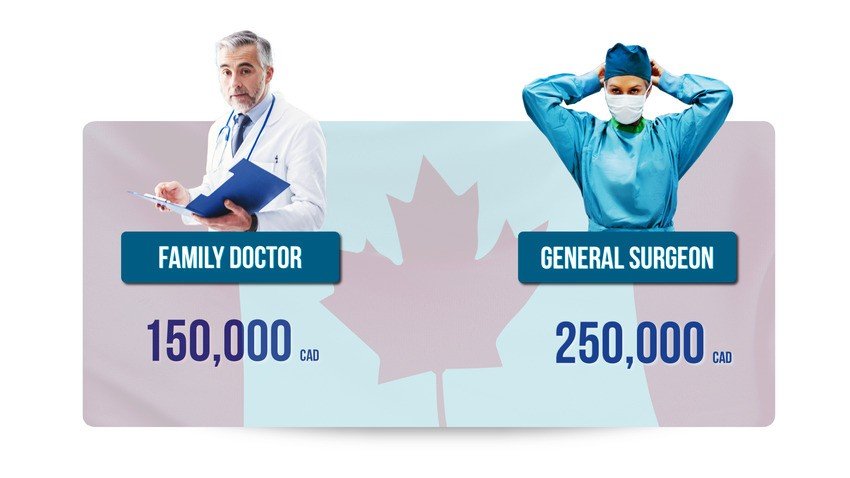
These numbers vary widely depending on where you practise. A physician in bustling Toronto or Vancouver might see a different pay scale. Then, one will serve a rural community in Saskatchewan or Newfoundland.
Here’s the truth I’ve come to understand. A doctor’s salary in Canada isn’t just a number. It stands for so much more. Expertise honed over the years, resilience in challenges and unwavering dedication to each patient’s well-being.
Canadian doctors live this reality every single day. They juggle immense workloads, often under intense pressure. All while pushing themselves to deliver better care for their patients and communities alike.
In the next section, we’ll take a clear look at what doctors in Canada earn today. This info might just change the way you think about medicine in Canada.
That said, let’s get straight to the point. Break it down with clear facts and practical insights that matter to you.
Top 5 Highest Doctor Salaries in Canada for 2025
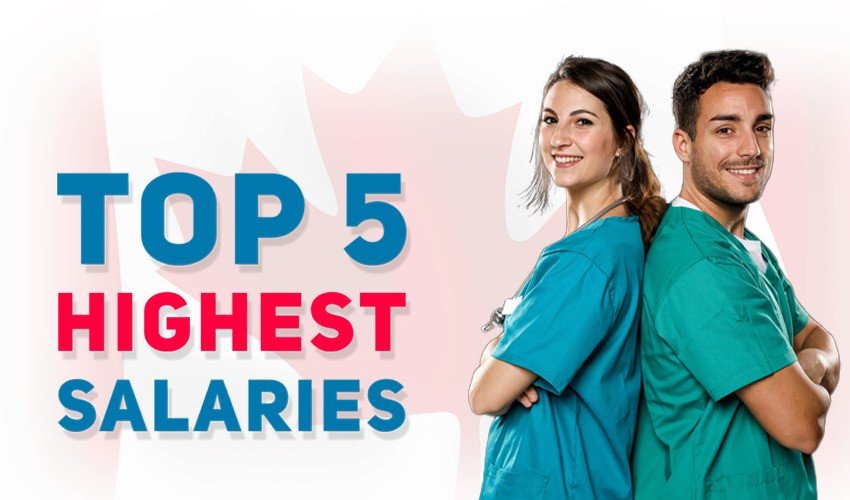
When you’re considering a career in medicine. Knowing where the highest salaries lie in 2025 can be a powerful motivator. It’s not just about passion and purpose. Though those matter greatly. It is also about ensuring your hard work pays off in today’s medical landscape.
Here’s the current (2025) lineup of the top earners among Canadian doctors. A list that highlights some of the most demanding and highly specialized fields in medicine right now.
At the very top of the 2025 list. Ophthalmologists lead the way. Following closely are neurosurgeons. Whose work on the brain and nervous system requires not only exceptional precision but also immense resilience and dedication.
Next, we find urologists in the third place on this list. Cardiothoracic surgeons come next. Performing life-saving operations that continue to demand extraordinary expertise and calm under pressure in 2025.
Lastly, obstetricians and gynecologists round out this elite group. This lineup helps you understand the Highest-Paid Specialties in 2025.
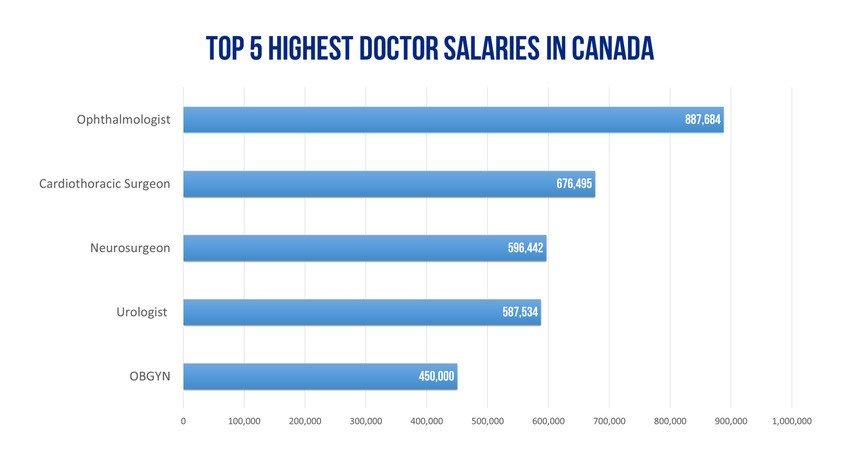
Knowing which specialties offer the biggest financial rewards helps you make informed decisions about your future. If you’re charting your career in healthcare, keep these current insights front and centre.
You might notice this 2025 ranking looks different from those just a few years ago. The landscape has shifted, with certain specialties climbing higher in pay. This is due to evolving demand, complexity, and workload. For instance, OBGYN’s place on the chart for 2025 highlights its increasing value and the changing dynamics in Canadian medicine.
Curious how these numbers compare with previous years? Trends in medicine shift quickly—it’s fascinating to see which specialties have moved up or down the ladder as of 2025.
If you want to get the full picture, check out the latest data and insights in the “highest paid doctors in Canada” blog post on Ace QBank. It’s packed with up-to-date information. Information that can help you make confident decisions about your own medical career.
What Are the Key Factors Influencing Doctor Salaries in Canada (2025)?

When we talk about what doctors earn. We are not just talking numbers on a pay stub. We’re talking about lives lived in service. Sacrifices were made behind closed doors. And the system was stretched to its limits.
A doctor’s salary in 2025? It’s more than dollars. It’s the story of long nights. Endless paperwork and a relentless commitment to patients. Often without the recognition they deserve.
This isn’t just about money. It’s about the rising costs of running a practice. The rent, the overhead and the ever-changing technology. That eats away at what’s left after a cheque arrives.
It’s also about the mental toll. The burnout that is creeping silently into the lives of those we rely on most.
A doctor’s annual salary in 2025 is influenced by several important factors. And these three have the most significant impact today:
- Geographic Location
- Overhead Costs
- Years of Experience
Given the promising future unfolding in Canada’s healthcare landscape, I won’t dive deeply into geographic location today. There’s a strong possibility this factor’s influence will continue to diminish in the coming years.
Instead, I want to focus on two critical and enduring factors that consistently shape a doctor’s earnings in 2025:
- Overhead Costs
- Years of Experience
Let’s talk overhead costs first. These are the expenses that keep a medical practice running. Everything from rent and staff salaries to supplies and cleaning. These don’t directly relate to patient care, but they’re absolutely essential.
Unlike many professionals who can adjust their fees, Canadian physicians in 2025 still face predetermined service fees, set by provincial guidelines or insurance plans. Doctors can’t simply raise their rates when costs go up.
For example, a dermatologist performing a non-invasive procedure in their office needs to comply with current standards by maintaining a surgical suite and regular cleaning.
A considerable overhead in the current year. If the office is inefficient or relies on costly suppliers, profit margins shrink, sometimes significantly. This is before factoring in big-ticket costs like leasing clinic space.
Poor office efficiency remains a silent profit killer in 2025, and many physicians still wrestle with it daily.
The other major factor is years of experience. Early in a career, salaries generally remain modest. New physicians in 2025 often earn 30 to 40% less than their more established colleagues, but experience makes a dramatic difference.
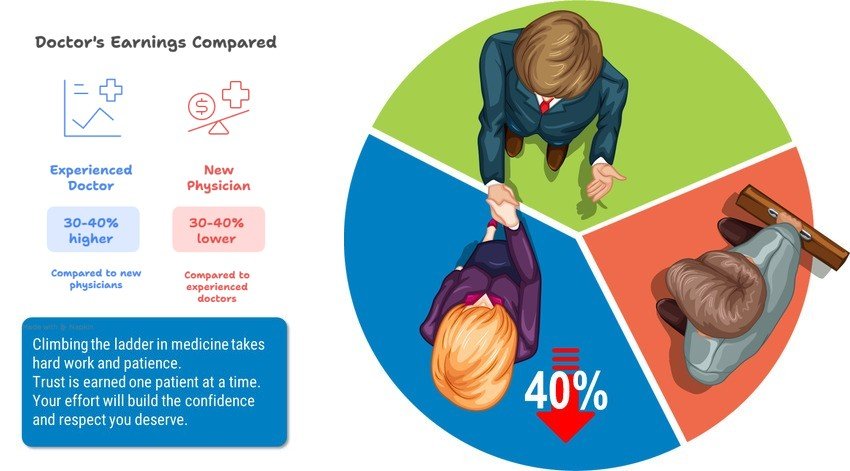
By the ten-year mark, most physicians reach peak earning potential. Thanks to honed clinical skills and well-developed interpersonal abilities.
Efficient doctors see patients more quickly while maintaining or improving care quality. They also master navigating the ever-shifting Canadian healthcare system and bureaucracy. An advantage that only comes with time.
Still, only a select few rise well above the average. These are the physicians who master both clinical excellence and office efficiency, setting the standard for what’s possible in 2025.
If you’re a medical student or resident reading this, know that it’s easy to be discouraged by talk of stagnant income. But with context, perseverance, and a focus on building both clinical and professional skills (think CanMEDs framework—professionalism, collaboration, leadership), you’ll discover the golden opportunities available in Canada.
The Other Highest Paying Medical Specialties in Canada
When you hear the words “highest paying medical specialties.” It’s natural for minds to jump to neurosurgery or cardiac surgery.
Those pinnacle professions are so often spotlighted in headlines and hospital dramas. Yet, across Canada, some of the highest earners in medicine work in specialties. Those are sometimes overlooked by the public eye.
Specialties Such as Family Medicine, Dermatology and Anesthesiology. Understanding why these fields command top compensation. Requires a look at the complexity of care being delivered. And the growing demands being placed on practitioners.
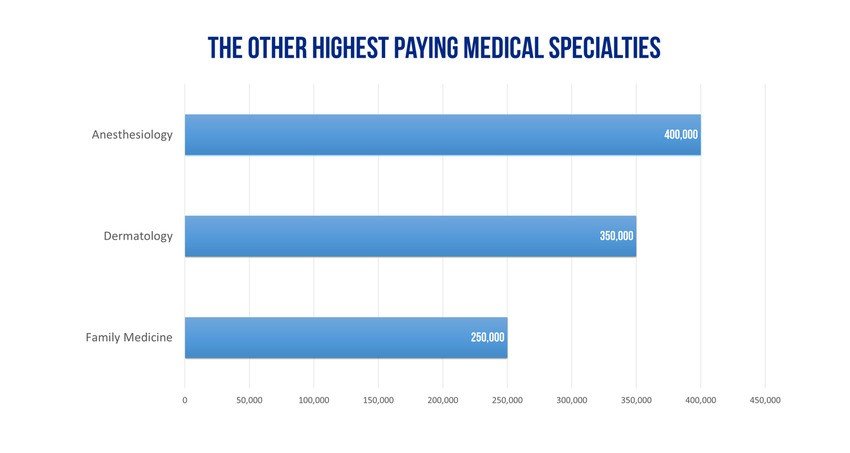
Family physicians stand as the backbone of Canada’s healthcare system, acting as the first call when Canadians seek medical care. These dedicated professionals manage a vast array of health concerns. And cultivate lasting relationships with their patient.
In Canada, family doctors earn a solid average salary ranging from CAD 250,000 to 300,000 a year. While not topping the charts for highest pay. The figure reflects their essential role in preventive medicine. And chronic disease management across the nation.
Demand for family physicians remains steadily high. Especially in rural communities. Where access to healthcare is often stretched thin. The government has taken note.
Introducing incentive programs like loan forgiveness that can total up to CAD 60,000. Over five years for those willing to serve in underserved areas.
Yet it’s not all smooth sailing. Despite competitive pay, many family doctors face real challenges. More than half report burnout. Much of the strain comes from mountains of paperwork and administrative tasks that steal time away from patient care.
Canada’s family physicians work tirelessly at the front line. Always advocating for their patients’ well-being. While carrying heavy loads behind the scenes. Their resilience underpins a system we all rely on every day.
Dermatologists in Canada stand at a remarkable crossroads of professional fulfilment and financial success. With average yearly earnings ranging between CAD 350,000 and CAD 400,000. These specialists enjoy rewards that mirror the intensity and precision their field demands.
The rigorous training involved in diagnosing and treating complex skin conditions underpins this strong earning potential. It’s a reflection not just of expertise. But of a commitment to patient care that is second to none.

What fuels this rising tide? The increasing prevalence of skin cancer. A nationwide surge in awareness about skin health. And the booming demand for cosmetic procedures all play their part.
This movement is especially pronounced in our bustling urban centres. Where dermatologists carve out thriving private practices. Balancing medical necessities with aesthetic innovation.
Anesthesiologists in Canada stand among the top earners in the medical field. Commanding annual salaries that typically range between $400,000 and $450,000. These specialists are indispensable during surgical procedures. Expertly safeguarding both patient comfort and safety when it matters most.
Their hefty pay packets mirror not just the steep responsibility their work entails. But also the years of rigorous training behind every successful operation. Despite this, Canada faces a shortage.
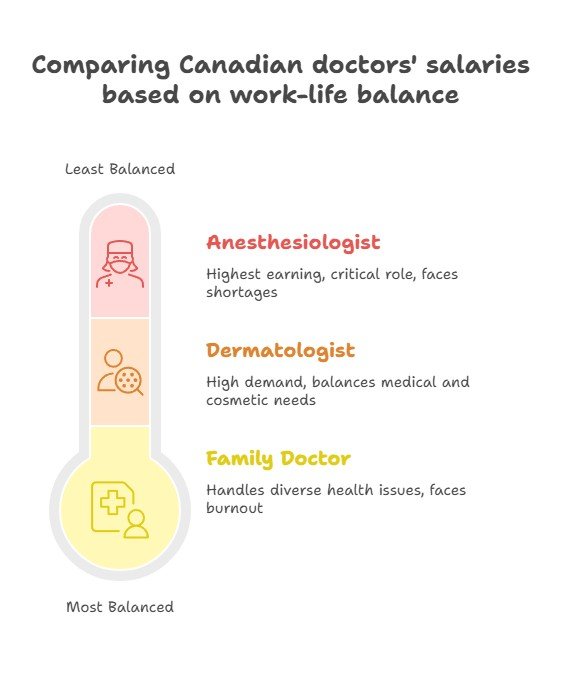
With only 4300 Anesthesiologists providing anaesthesia care. The current ratio stands at 11 per 100,000 people. This figure is notably lower than that of many peer nations. This gap underscores why demand for these experts remains strong coast to coast.
It’s a high-stakes profession. Where expertise and precision quite literally save lives.
What’s The Role of the MCCQE1 Exam Prep in Doctor Salary?
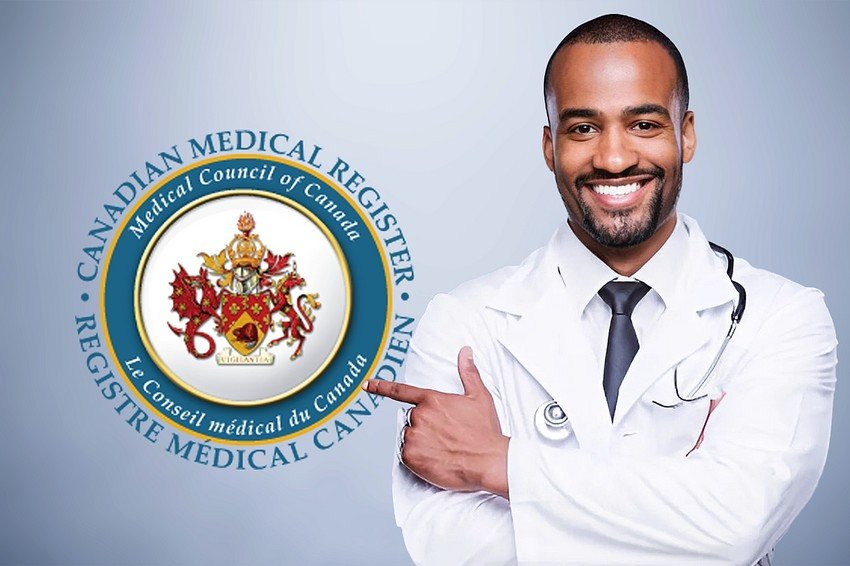
Look when you’re pouring countless hours, energy and often significant financial resources. In preparation for the MCCQE Part 1 exam.
It is natural to wonder, “How does this really affect my future income?” We are talking about your career. Your livelihood and the return on this massive investment of time and brainpower.
Here’s the reality. Passing the MCCQE Part 1 doesn’t automatically add a specific dollar amount to your first pay cheque as a licensed physician. There’s no line item on a doctor’s salary slip that says “Bonus for Passing MCCQE1.”
Doctor salaries in Canada are primarily determined by several factors. Factors like your chosen medical specialty. Your practice location (urban vs. rural, different provinces have different fee schedules). And whether you work in a fee-for-service, salary or alternative payment model.
So, does that mean your MCCQE1 exam preparation has no role in your earning potential? Absolutely not.
Its role isn’t direct. But it is profoundly foundational and indirectly critical to your future salary trajectory. Think of it less as a direct salary negotiation tool and more as a high-stakes gateway. And a potential accelerator for your career path.
Licentiate of the Medical Council of Canada (LMCC) is Non-Negotiable
First and foremost, passing the exam is a mandatory requirement. It is one of the requirements for obtaining a medical license in Canada.
Without a License from the Medical Council of Canada or LMCC. You cannot legally practice medicine as a physician in this country. And if you can’t practice, you can’t earn a doctor’s salary. Period.
This is where your MCCQE1 exam preparation becomes paramount. Effective, dedicated preparation for the exam. Significantly increases your probability of passing this crucial exam on your first attempt.
Note
If you are an international medical graduate, listen closely. Passing the exam, on your first attempt, with a high score. It is not just important, it is essential. For you, more than anyone else, this is the moment that defines your journey. There is no trail of your medical passion here.
The MCCQE1 and NAC are tangible proofs of your unwavering commitment. Evidence that speaks louder than words.
Yes, matching decisions considers many factors. But don’t let those impressive credentials slip away. This exam is your gateway. Embrace it with everything you have.
Failing means delays. Delays in getting licensed. Delays in starting residency. Consequently, delays in earning a physician’s income.
Each delay can translate into lost earning potential over the span of your career. So, the most fundamental role of MCCQE1 exam preparation is to ensure you clear this challenging exam. To even begin earning as a doctor in Canada.
MCCQE1 Exam Prep Opening Doors in CaRMS
Now, here’s where the indirect link to higher earning potential often comes into play. Matching into a residency program.
While the MCCQE part 1 exam is a required exam in terms of licensure. Your score is reported. And it can be a factor considered by residency program directors. When? During the highly competitive CaRMS (Canadian Resident Matching Service) process.
Getting into a residency program is the next critical step. After medical school and the MCCQE1. Your choice of specialty during residency. It is arguably one of the most significant determinants of your future earning potential.
But is it the determining factor? The answer is no. There are cardiologists who earn as much as a rookie family doctor. And there are family doctors who outshine dermatologists. The point is that salaries vary significantly across medical disciplines.
While program directors look at a holistic application. Including your medical school performance, reference letters and research experience. Electives and interview performance – a strong MCCQE1 score can make your application more attractive. Particularly for highly competitive and often higher-paying specialties.
It serves as a standardized measure. The measure of your foundational medical knowledge compared to your peers. Solid prep aims not just to pass, but to perform well.
This potentially gives you an edge in securing a spot in a residency program. The residency program that aligns with your career goals and earning aspirations.
So, while MCCQE1 prep doesn’t directly dictate your starting salary. It is an indispensable investment in your future earning potential. It’s the key that unlocks licensure. The foundation that supports a strong residency application (potentially for higher-earning specialties). And the process that reinforces the critical knowledge you’ll need throughout your career.
What is the Most Effective Strategy for MCCQE1 Exam prep?

I know that you are aware that the exam is challenging. And the question isn’t if you need to prepare. But how to prepare effectively and efficiently? You’re dealing with a vast amount of medical knowledge, and simply rereading textbooks isn’t the strategic approach you need.
So, what’s the single most effective strategy? Hands down, it’s leveraging a high-quality, Canadian-focused question bank.
Why a question bank, and specifically a Canadian one? Because the MCCQE1 isn’t just a test of rote memorization. It’s a test of applying your knowledge within the Canadian healthcare context. Based on the specific objectives set by the Medical Council of Canada.
A top-tier Canadian question bank is built precisely on these objectives. It provides you with high-yield questions designed to mirror the format. And the content you’ll encounter on exam day.
These aren’t just random knowledge checks. They are crafted to challenge your problem-solving skills. Forcing you to use your knowledge to work through clinical scenarios. Just like you will in practice (and on the exam).
This active recall and application process is far more effective than passive reading. As you tackle these questions. You’ll quickly pinpoint your knowledge gaps. Those areas where your understanding is weak or incomplete.
This isn’t a setback. It’s a strategic advantage. Identifying these gaps before the exam allows you to target your review precisely. Where it’s needed most. Ensure you cover the MCC objectives properly and build a robust understanding.
Think of it as targeted training. You’re not just running laps. You’re doing specific drills designed to improve your skills. Skills you’ll need for the actual race.
Using a Canadian question bank is the most direct and high impact way to prepare for the MCCQE1. In particular, the most effective question bank for MCCQE1 exam prep is Ace QBank.
How can Ace QBank Help with MCCQE1 Exam Prep?

You need to pass the MCCQE1 to get licensed in Canada. You know that passive reading isn’t enough. And you need a strategic tool that forces you to apply your knowledge in a Canadian context.
We’ve said the best way to do this is with a Canadian question bank. But with options out there, how do you choose? And more importantly, how does the right one actually help you succeed?
The question bank you need for the MCCQE Part 1 exam success is Ace QBank. The Qbank has consistently proven its value. The platform is widely regarded as the leading Canadian question bank.
One that is specifically designed for the MCCQE1 exam prep. And it comes with a track record. A decade of high success rates among its users. This isn’t just another study Qbank. It’s a focused, high-impact system built for this specific exam.
So, how does Ace QBank help with your MCCQE1 preparation? First, and perhaps most critically, it is meticulously designed based on the objectives set by the Medical Council of Canada.
This isn’t a generic medical Qbank adapted for Canada. It’s built from the ground up. To align with what the MCC expects you to know and be able to do. This means every question you tackle is relevant.
And contributes directly to covering the vast landscape of the MCC objectives properly. You’re not wasting time on low-yield topics or information outside the scope of the exam. You’re focusing your energy precisely where it needs to be.
Second, the Qbank excels in providing those “high-yield” questions we talked about. These are the 2800 questions that test the most important concepts. The most common clinical presentations in Canada.

And the critical decision-making points you’ll face both on the exam and in practice. They are designed not just to test recall. But to challenge you to interpret data and apply your knowledge to solve realistic clinical problems.
This active engagement with the questions. It is exponentially more effective for retention of the key points. And an understanding of the medical concepts.
This brings us to a crucial point. Identifying your knowledge gaps. Working through Ace QBank questions is like putting your understanding under a microscope.
When you get a question wrong (and you will get questions wrong – that’s part of the learning process!). The detailed explanations provided by the QBank are invaluable.
It doesn’t just tell you if you’re right or wrong; it provides thorough, evidence-based explanations for every answer.
An explanation that explains why it’s right and why the other options are wrong. It also provides context and teaching points related to the underlying medical concept.
This process allows you to pinpoint exactly where your understanding is weak or incomplete. Is it a specific disease? An approach to diagnosis or management? The Qbank helps you see these gaps clearly. Allowing you to go back and target your review precisely. Rather than blindly rereading entire textbooks.
This deepens your understanding, reinforces clinical reasoning, and helps you think like a Canadian physician – exactly what the MCC is looking for.
Furthermore, using the question bank simulates the actual exam experience. You get comfortable with the question format. The interface and the pressure of working through questions under timed conditions.
This familiarity reduces anxiety on exam day. And allows you to focus purely on the medical content. On the other hand, it will hone your time management skills.
The other valuable feature is the hundreds of Visual Aids. Complex medical concepts become much clearer with visual help. The Qbank offers flowcharts, summary tables, and custom illustrations. These visual tools act as mental anchors, simplifying difficult topics and significantly boosting your recall under exam stress.

Another exclusive feature of Qbank is the challenge of self-assessments. They are included in the Premium Package. However, self-assessments can be purchased separately.
These aren’t just repeats. They feature unique, challenging questions designed by medical experts to rigorously evaluate your MCCQE1 readiness. Taking these assessments will help you pinpoint weak areas before the actual exam day, giving you time to adjust your study strategy and ultimately, increase your confidence.
The fact that Ace QBank has a decade of high success rates isn’t just a marketing point. It’s evidence that their methodology works.
It means countless candidates before you have used this resource. And found it effective in navigating the complexities of the MCCQE1. You’re leveraging a proven system.
Where Can I Find Free MCCQE Part 1 Sample Questions?
To access the free Sample Questions, you need to sign up for a free demo account. This is your chance to explore the entire Qbank interface.
Hands-on experience with features like flagging questions. Highlighting key points, creating question blocks and choosing study modes. All the features that can make your study sessions more effective.
Trying out these features gives you a realistic feel for how the platform supports your exam preparation. It’s like practicing under real conditions. Which can boost your confidence and efficiency. Plus, it helps you see if the Qbank matches your learning style and study needs.
Taking advantage of free sample questions is more than a freebie. It’s a smart way to test the waters before committing.
So, sign up for the free demo. Explore the features, try the questions and decide if this question bank. It will be your trusted companion. On your journey to becoming a licensed physician in Canada.
Key Takeaways
Top Paying Medical Specialties in Canada. The highest paid specialties include ophthalmology, neurosurgery and urology. Along with cardiothoracic surgery, obstetrics & gynecology.
Key Factors Influencing Doctor Salaries. Major factors affecting earnings include overhead costs (clinic operation expenses that reduce net income), years of experience (with peak earnings typically reached after about ten years), and geographic location.
MCCQE1 Exam Preparation Is Critical for Career and Earnings Potential. Passing the exam doesn’t directly increase salary. However, strong preparation improves exam success and residency matching chances. Ultimately, the ability to enter higher-paying specialties.



